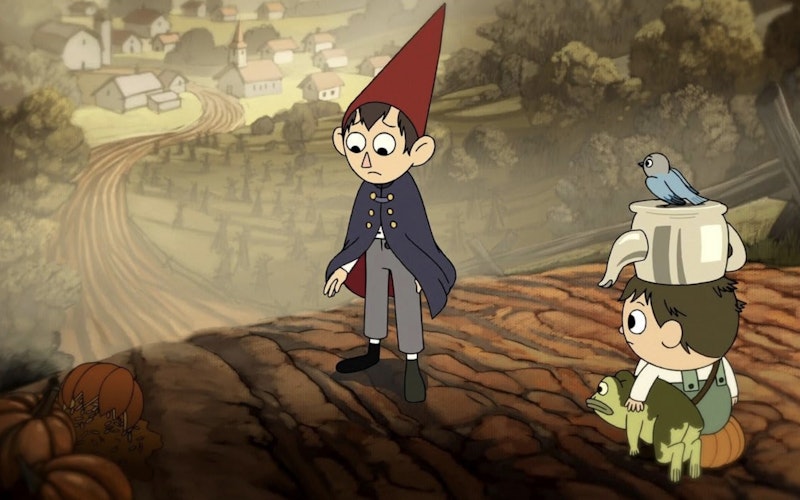
TV
Over the Garden Wall and Our Own Spiritual Pilgrimages
Something strange lies just beyond the trees. It beckons to us and we must follow.
This is the pull of Over the Garden Wall, an animated television series that was released on Cartoon Network in November of 2014. Created by Patrick McHale, the Emmy-winning series has become something of an indie classic. Fans are still drawn to these spooky and whimsical woods, ritualistically rewatching the series every autumn.
We meet Wirt and Greg, two young brothers who find themselves lost in a dark forest called the Unknown. Deeply troubled by their plight, older brother Wirt (voiced by Elijah Wood) asks, “What are we doing out here?” Younger brother Greg (Collin Dean) replies, “We’re walking home!”
Wirt is fundamentally moody and pessimistic, whereas Greg, accompanied by his pet frog, bears a childlike hope. He is certain that the pair will arrive home, exactly when they are meant to do so. Hope is the prevailing force that drives the duo through this strange realm.
Along the way they meet an old Woodsman (Christopher Lloyd) who scolds them: “These woods are no place for children! Don't you know the Beast is afoot here?” Indeed, something diabolical lurks nearby. “Welcome to the Unknown, boys. You’re more lost than you realize,” the Woodsman adds, warning them to fear the Unknown and flee the woods if they can.
The series is full of a comforting richness paralleled by somber tones. It’s wrapped in a wonderful, unnameable nostalgia for a forgotten place. For many people, there’s something inherently true and relatable in this story. The series has its own particular take on American folklore, featuring strange yet familiar places. In storylines like these, viewers begin to realize that they’ve been here before. Whether physically or metaphorically, we’ve all been lost in the woods. Aesthetically, the show’s picturesque autumnal environment is evocative of a cozy youth. Yet it also tells unsettling stories, making us feel like we’ve forgotten parts of our past. We can’t help but feel like something is terribly wrong in this lovely place. The eerie nature of the vignettes compel us to desire escape.
We all have a torch to burn, as the Woodsman puts it. He wanders the forest, lantern in hand, searching for Edelwood tree branches to keep the lantern lit. Our torches are different, but carry them we must. At the same time, the Beast is ever-prowling, taunting his listeners to despair. He sings, “When the fog of life surrounds you / When you think you've lost your way / Come with me and join the forest / Come with me and join the play.” The Beast searches out those who are lost and far from home, attempting to destroy their will to journey on. He embodies the death of hope itself.
Still, the boys cling onto their hope. One evening, they enter a tavern, seeking shelter from a storm. The patrons try to identify them. The Baker cries out, “You’re a pilgrim! You’re a traveler on a sacred journey.” Here in the Unknown, viewers find themselves on their own spiritual pilgrimage. All who walk the earth are pilgrims, surely destined for a journey of peril and woe, but ultimately one heading toward eternity. Along the way, we discover companions, face pitfalls, and endure bitter struggles. Over the Garden Wall shows us that we are only lost if we are without hope.
We find this truth in Scripture. We read in 1 Peter 5:8-9, “Be alert and of sober mind. Your enemy the devil prowls around like a roaring lion looking for someone to devour. Resist him, standing firm in the faith, because you know that the family of believers throughout the world is undergoing the same kind of sufferings.”
In Over the Garden Wall, we learn the lesson of clinging to our hope and remaining on the path set before us, even when the way ahead seems uncertain. We’re all lost souls struggling to hold onto hope when the fog grows deep and threatens to suffocate what conviction remains in our spirits. Over the Garden Wall teaches us how to hope in dark times. In Psalm 23:4 we read, “Even though I walk through the darkest valley, I will fear no evil, for you are with me; your rod and your staff, they comfort me.” The show masterfully pairs horror with comfort. This is the pull of the show itself, and why so many people return to the story. In the midst of the things that scare us, we cling to coziness. Comfort is radical in the midst of evil. It rescues us from despair.
Over the Garden Wall mirrors the gospel in profound ways. Greg, who’s pure in heart, offers himself up in service of those he loves. He saves those who cannot save themselves, pointing us back to Jesus’ ultimate sacrifice. Where the Beast seeks to invoke fear and death, Greg embodies unabashed hope and teaches us what it means to be a living sacrifice. In a moment of complete hopelessness, Greg responds to darkness with goodness.
Over the Garden Wall reveals the truth that we all feel lost along our journeys and that redemption is our ultimate aim. What matters most is our capacity to hold onto hope, because at one time or another, we all tumble over the garden wall and into the unknown.
_______________
At Think Christian, we encourage careful cultural discernment. We recognize and respect that many Christians choose not to engage with pop culture that contains particular content, such as abuse, sex, violence, alcohol or drug use, or that employs the use of coarse language. To that end, we suggest visiting Common Sense Media for detailed information regarding the content of the particular pieces of pop culture discussed in this article.
Topics: TV